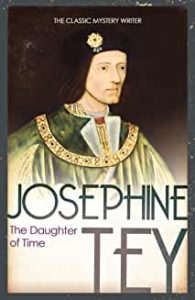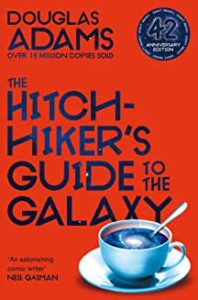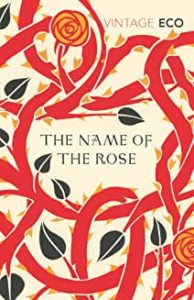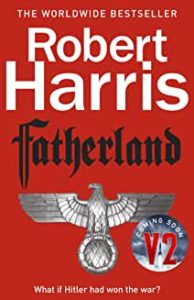Decades: Compiling the Ultimate Library with Chris Lloyd
Decades is into its third month and my Library is growing. Library? What Library?
Late last year I pondered the dilemma a librarian may face if they were asked to create a new library. They have absolutely no books, none, a blank slate. Where would you start? From here my challenge began – compile the Ulimate Library, invite guests to join me in selecting the books they feel should be added to the shelves. But we must have rules to govern this venture or we risk anarchy.
Rule 1 – Guests can pick any five books.
Rule 2 – Only one book per decade for any five consecutive decades.
That’s it. Easy! Or seemingly not as when my guests try to make their five choices I am told there can be cussing and indecision.
Today I am thrilled to be joined by Chris Lloyd. When I compiled my favourite Audiobooks of 2020 there was never a doubt in my mind that The Unwanted Dead, published by Orion, would feature. Chris tells me that the paperback of The Unwanted Dead is out on March 18th so I could think of no better guest to invite to participate in my Decades challenge this week. Before I get Chris to introduce himself I would urge you to seek out The Unwanted Dead this week and when you have finished and enjoyed that one here are some of his other books to get your teeth into: https://www.amazon.co.uk/Chris-Lloyd/e/B01GQH7Q5C?ref=sr_ntt_srch_lnk_1&qid=1615537791&sr=8-1
Decades
My name’s Chris Lloyd and I have a tendency to go around in circles. I grew up in South Wales, where my parents moved from their native mid-Wales after more than a decade of living abroad, so when it came to my turn, I went and lived in Catalonia for twenty-four years. I lived in Girona and then Barcelona, where I taught English, worked in educational publishing, wrote guide books, almost appeared on TV three times and translated. Interspersed with this, I also lived in Bilbao and Madrid, and I spent six months as a student in Grenoble researching the French Resistance, even though I kept coming back to Catalonia. I told you I went around in circles. As yet more proof of that, I moved back to Wales a few years ago, where I live near enough to the Brecon Beacons to feel the cold, but not so close as to enjoy the scenery. But never mind that as I’m about to move with my wife to my childhood home by the sea, which we’ve been trying to do for years.
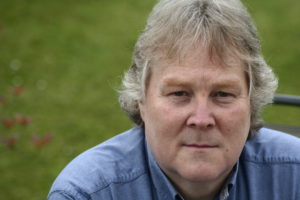 I spend part of my day translating academic texts from Catalan and Spanish and another more fun part of the day writing crime fiction. I wrote a trilogy for Canelo set in Girona, featuring Elisenda Domènech, a detective with the Mossos d’Esquadra, the Catalan police force, which is about to come out in audiobook.
I spend part of my day translating academic texts from Catalan and Spanish and another more fun part of the day writing crime fiction. I wrote a trilogy for Canelo set in Girona, featuring Elisenda Domènech, a detective with the Mossos d’Esquadra, the Catalan police force, which is about to come out in audiobook.
The result of my lifelong fascination with resistance and collaboration in Occupied France, I now write the Eddie Giral series, set in Paris in World War Two and featuring a Paris police detective forced to come to terms with the Nazi Occupation of the city. Seeking to negotiate a path between the occupier and the occupied, Eddie struggles to retain some semblance of humanity while walking a fine line between resistance and collaboration. The first book in the series, The Unwanted Dead, published by Orion, comes out in paperback on 18 March.
You can come and say hello on Twitter at https://twitter.com/chrislloydbcn or take a look at my website at https://chrislloydauthor.com/
I want to thank Gordon for inviting me to contribute to this brilliant idea, and also for setting me the completely impossible task of finding my favourite book from each decade over five decades – I felt actual pain every time I had to eliminate a book I loved from the list to arrive at the five below. I’ve gone for the 1950s to the 1990s, and even that decision was tough. I hope you like some of my choices.
1950s – The Daughter of Time – Josephine Tey This is the perfect crime book, the Lord Reith of crime writing – it informs, educates and entertains. A story of a police detective confined to a hospital bed who decides to investigate the murder of the princes in the tower, it’s a textbook showcase of the limitless possibilities that crime fiction can offer. It not only contributed to the historical debate about the role of villain that history had assigned to Richard III, it’s also a powerful insight into character and, quite simply, a bloody good detective story
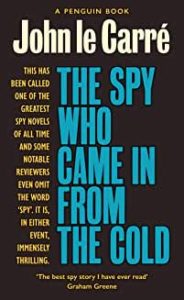 1960s – The Spy Who Came in from the Cold – John Le Carré
1960s – The Spy Who Came in from the Cold – John Le Carré
The lesson this book taught us is that heroes can be amoral, unpalatable people, and you don’t have to root for them any the less because of it. Le Carré changed the rules with The Spy Who Came in from the Cold, and I firmly believe we as readers and writers have been benefiting from it ever since. He made it all right for main characters to be fundamentally flawed and unlikeable – even ordinary – and for the supposed good that they are striving for to be
achieved using methods that are no less morally reprehensible than the supposed evil they are fighting against. It was a sea change in depth and understanding of character and of heroes and villains.
1970s – The Hitchhiker’s Guide to the Galaxy – Douglas Adams
From the very first line with its “unfashionable” end of the galaxy to Marvin the Paranoid Android with a brain the size of a small planet, The Hitchhiker’s Guide taught me that it was perfectly all right for a book to be both very intelligent and delightfully silly. In fact, the silliness is born out of the intelligence and really isn’t that silly anyway when you look close enough. Quite apart from that, it’s also a hymn to playfulness not just with story, but with language. Read this book and your view of the universe will be altered forever – in a good way.
1980s – The Name of the Rose – Umberto Eco
There are few books that can compare with The Name of the Rose when it comes to creating an unsettling atmosphere. The harshness of the setting and the description of the weather outside the confines of the monastery conjure up a sense of brooding malevolence that is both exacerbated and symbolised by one of the most bizarre casts of characters in any book. Also, I started reading it alone at night in a Spanish castle, which might not have been the best idea, but it certainly helped set the mood.
1990s – Fatherland – Robert Harris
I’m beginning and ending these decades by closing the circle with a celebration of just how far you can go with crime fiction. My favourite ‘What if…’ story, Fatherland takes place in a 1960s Berlin in a world where the Nazis won. A police detective is investigating a case that leads him to suspect a far greater crime, one that we all know with the hindsight of history but that he doesn’t. And that’s the power and brilliance of the book – to be able to take one of the most evil moments in history and reveal it once again with renewed horror as it becomes apparent to the protagonist.
My most sincere thanks to Chris for his excellent selections and for taking time to join my Decades challenge. The Unquiet Dead is released in paperback on 18th March – 1940, a Paris cop investigating murders while his city is taken under Nazi control…I don’t do it justice when I say I found it a brilliant read.
If you want to catch up on which books have already been added to my Library then you can visit it here: https://grabthisbook.net/?p=5113
